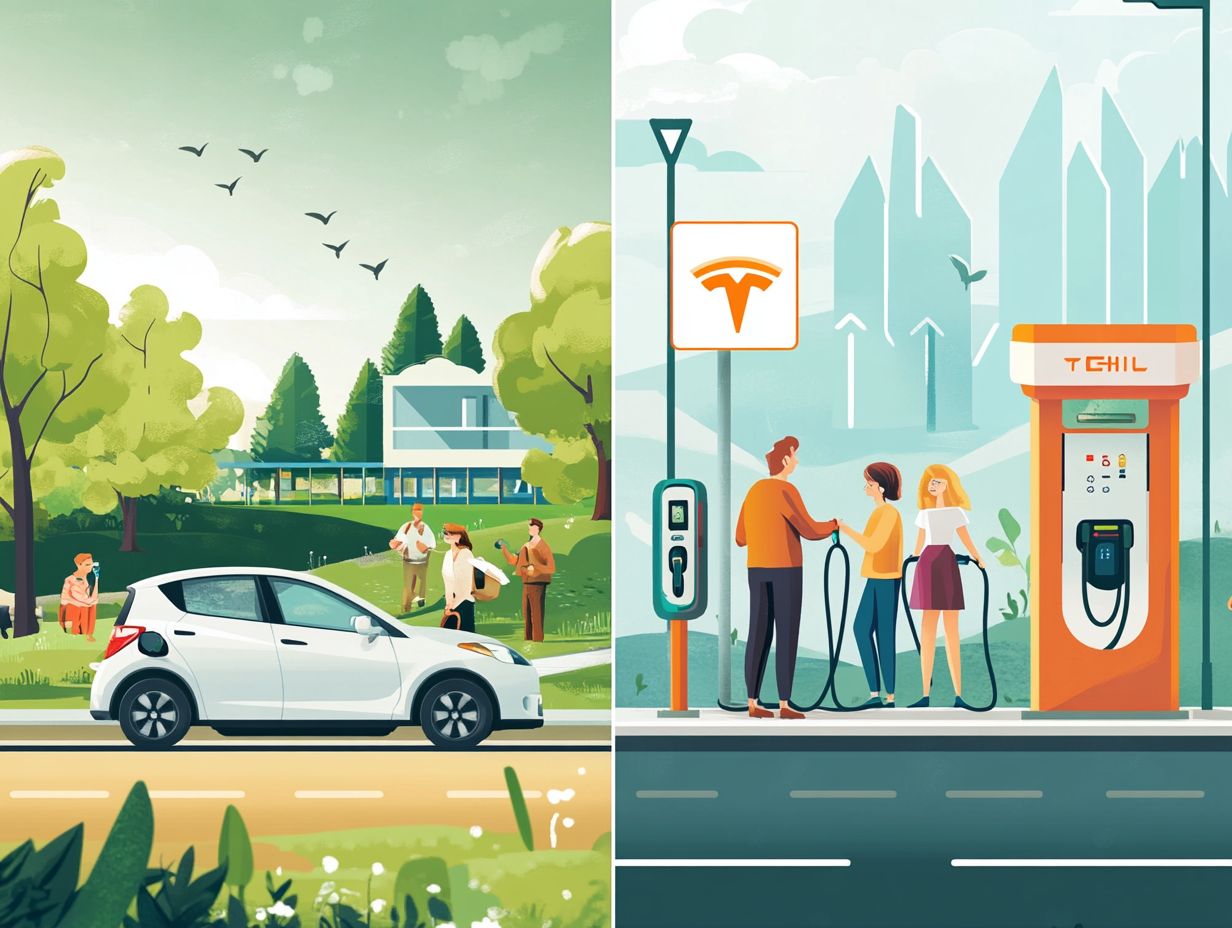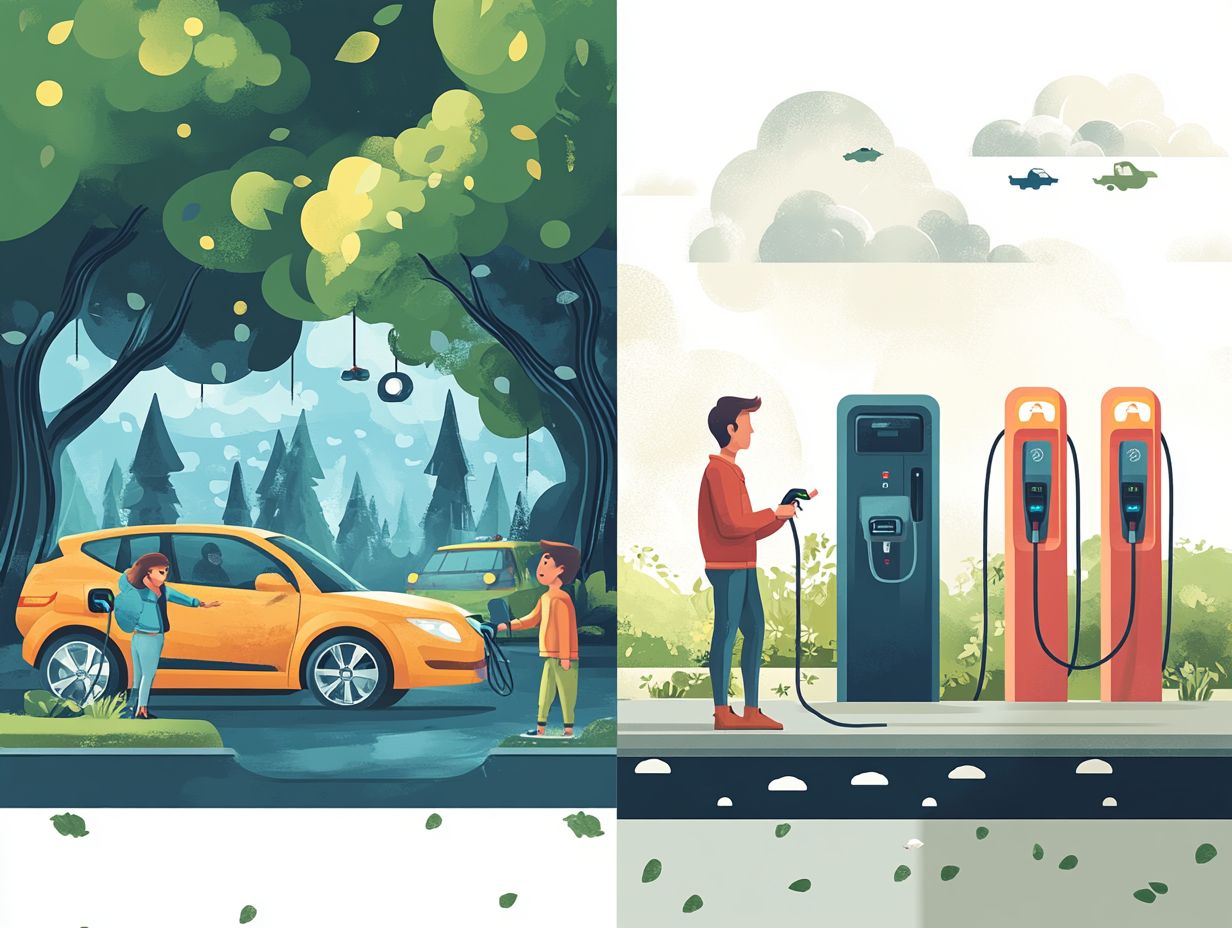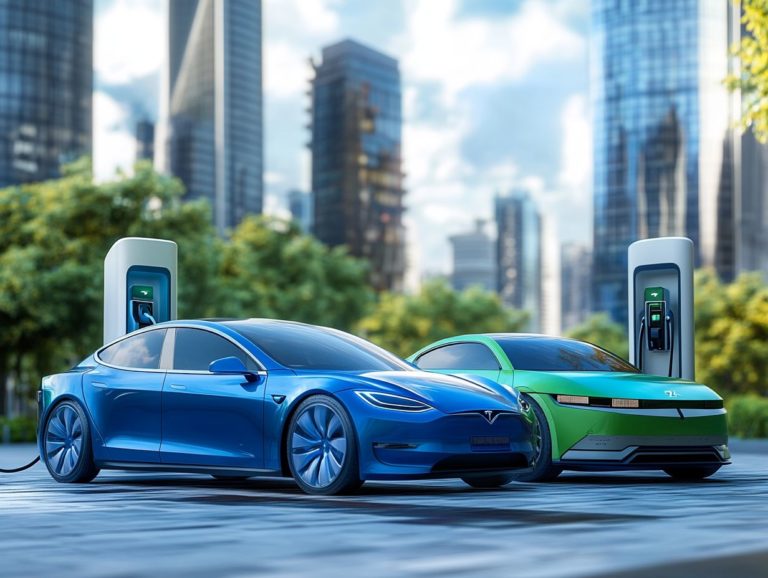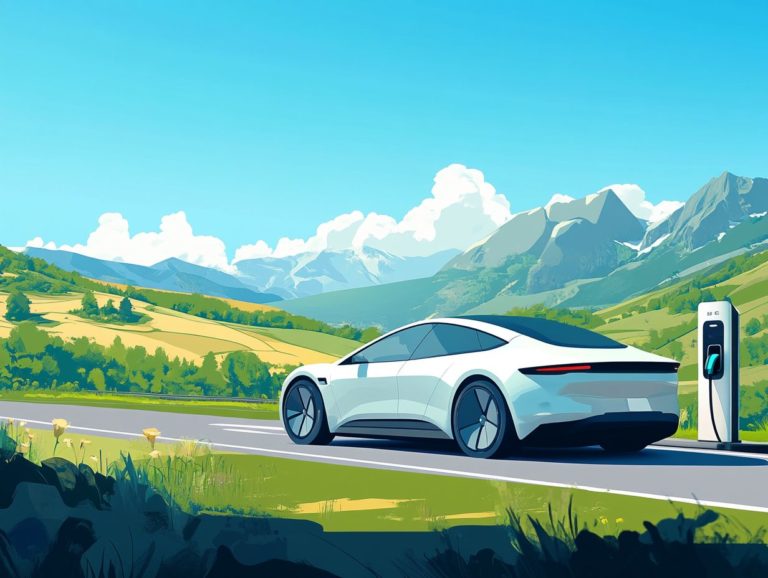what are the pros and cons of electric vehicles?
Electric vehicles (EVs) are revolutionizing your perspective on transportation, presenting a cleaner and often more cost-effective alternative to traditional gasoline-powered cars.
As their popularity surges, you ll encounter a blend of benefits and drawbacks. From big environmental benefits and financial savings to challenges in charging infrastructure and higher initial costs, grasping the complete landscape is crucial for any potential buyer like you.
In this article, we ll explore the pros and cons of electric vehicles, highlight essential considerations before you make a purchase, and offer a glimpse into their promising future.
Embark on this journey as you navigate the thrilling world of automotive innovation!
Contents
- Key Takeaways:
- Advantages of Electric Vehicles
- Disadvantages of Electric Vehicles
- Considerations Before Purchasing an Electric Vehicle
- Future of Electric Vehicles
- Frequently Asked Questions
- What are the pros of electric vehicles?
- What are the cons of electric vehicles?
- Are there any financial incentives for owning an electric vehicle?
- Do electric vehicles have a negative impact on the environment?
- What is the lifespan of an electric vehicle battery?
- Can electric vehicles be charged at home?
Key Takeaways:

Electric vehicles offer significant environmental benefits, such as reducing greenhouse gas emissions and improving air quality. Owning an electric vehicle can result in long-term cost savings, as they require less maintenance and have lower fuel costs compared to traditional vehicles. Before purchasing an electric vehicle, it is important to assess personal needs and lifestyle to determine if it is a practical option.
What are Electric Vehicles?
Electric vehicles (EVs) represent a groundbreaking shift in the automotive world, running only on electricity. This innovation significantly reduces your reliance on fossil fuels, paving the way for a more sustainable future.
Whether you’re considering fully electric cars or plug-in hybrids, these vehicles utilize advanced batteries to store energy and effectively propel you forward. Industry leaders like Tesla are at the forefront, pushing innovative technologies and performance enhancements that redefine what you can expect from an automobile.
Understanding electric vehicles involves more than just grasping how they work; it encompasses their design, operational efficiency, and their profound potential impact on both climate and society.
These remarkable vehicles harness sophisticated electrical systems aimed at maximizing energy efficiency, ensuring you get the most mileage out of every charge. Major manufacturers are exploring a variety of cutting-edge technologies, such as solid-state batteries and regenerative braking, a system that helps recharge the battery when you slow down. These advancements not only enhance range but also elevate overall performance to new heights.
The environmental advantages of EVs are significant. With zero tailpipe emissions, they can be charged using renewable energy sources, further reducing your carbon footprint.
As the market continues to flourish, electric vehicles not only promise to revolutionize personal transportation but also stand poised to reshape the entire ecosystem of energy consumption and urban planning.
Advantages of Electric Vehicles
Electric vehicles present a wealth of advantages that enhance both your personal experience and contribute positively to society. These benefits include notable environmental impacts, substantial fuel savings, and lower maintenance costs when compared to traditional gas-powered vehicles.
The key lies in EVs ability to operate with significantly reduced emissions, helping lower your overall carbon footprint. Financial incentives like the EV tax credit make the transition to electric cars appealing, making it not just environmentally sound, but also financially advantageous.
Environmental Benefits
The environmental benefits of electric vehicles are truly remarkable, as they significantly cut down on vehicle emissions. By harnessing renewable energy sources like solar panels, you can further elevate the sustainability of EVs, positioning them as key players in the pursuit of a cleaner environment.
When you charge these vehicles with solar energy, the reduction in greenhouse gas emissions becomes even more profound, creating a virtuous cycle of sustainability. Integrating renewable power not only diminishes dependence on fossil fuels but also promotes the growth of clean energy infrastructures.
As more individuals and businesses adopt this technology, they contribute to a future where electric vehicles flourish alongside green energy solutions, leading to improved air quality and a cooler planet.
Ultimately, this synergy between electric transportation and renewable energy sets the stage for a greener world, offering benefits that extend to both current and future generations.
Ready to make the switch to an electric vehicle? Discover more options today!
Cost Savings

Electric vehicles present an opportunity for substantial cost savings, particularly through reduced fuel expenses and lower maintenance costs compared to traditional gasoline vehicles. With rising fuel prices, the financial perks of electric cars become even clearer.
The energy-efficient nature of these vehicles can lead to dramatically lower fuel costs, as charging an electric car often costs only a fraction of what you typically spend on gasoline. With fewer moving parts, electric vehicles experience less wear and tear, translating to minimal maintenance needs.
Many states enhance this appeal further by offering perks like rebates and access to carpool lanes. By taking advantage of these savings and incentives, you can enjoy both environmental benefits and relief on your wallet.
Disadvantages of Electric Vehicles
Electric vehicles have many benefits, but be aware of their drawbacks.
One of the main challenges is the charging infrastructure, which can be lacking in certain areas. This can impact your confidence and convenience for longer journeys.
The higher upfront costs of electric vehicles might give you pause, especially if you re used to more traditional options. Concerns about driving range could also factor into your decision-making process.
Challenges with Charging and Range
Finding charging stations can be a challenge for electric car owners. Public charging infrastructure is expanding, but it often remains inconsistent, leading to worries about running out of charge.
This inconsistency can pose hurdles, especially in rural regions where charging stations might be few and far between. Charging times can vary greatly depending on the type of charger used; a standard outlet may take hours, while fast chargers can cut the waiting time down to under an hour.
These lengthy charging periods can dampen spontaneity when traveling, compelling you to plan your routes and stops carefully. As electric vehicles gain popularity, tackling these challenges is essential for enjoying modern driving’s freedom and flexibility.
Higher Upfront Costs
The higher upfront costs of electric vehicles can pose a significant barrier for you. Good news! There are financial incentives available to help ease some of those initial expenses, making electric cars more accessible.
Many states and local governments offer additional programs that enhance the affordability of EVs, including:
- Grants
- Low-interest loans
Utility companies often provide special rate plans or rebates for those who charge their vehicles during off-peak hours, allowing you to save even more. With the increasing availability of used electric vehicles, you now have a budget-friendly option if you re looking to switch to sustainable driving.
By understanding these financial avenues, you can navigate the initial cost hurdle and embrace the environmental and economic benefits that electric vehicles offer.
Considerations Before Purchasing an Electric Vehicle

Before buying an electric vehicle, evaluate your needs and lifestyle. This ensures the switch suits you well.
Consider factors such as your daily commuting distance, the accessibility of charging stations, and anticipated maintenance costs.
Taking time to reflect on these aspects will enable you to make a well-informed decision that suits your lifestyle perfectly.
Assessing Personal Needs and Lifestyle
Assessing your personal needs and lifestyle is essential when considering a switch to an electric vehicle. This evaluation can significantly shape your decision-making process.
Consider factors like your daily driving habits, access to charging stations, and savings on gas. Each of these elements should be meticulously evaluated to determine if an electric car truly meets your specific requirements.
Understanding your typical driving distance is crucial. It can help you gauge whether an electric vehicle will suffice, especially if your commutes are lengthy or involve frequent long trips.
The availability of home or public charging infrastructure is equally vital. Without convenient access, owning an electric vehicle could quickly become a hassle.
Financial considerations cannot be overlooked. Potential buyers should explore incentives, rebates, and the overall cost of ownership compared to traditional vehicles.
By comprehensively evaluating these factors, you can make informed decisions that align perfectly with your unique circumstances and lifestyle preferences.
Future of Electric Vehicles
The future of electric vehicles looks exceptionally promising, propelled by rapid technological advancements and shifting market trends. These changes usher in a new era of more affordable, efficient, and user-friendly electric cars.
With innovations in battery technology, charging infrastructure, and energy efficiency, the allure of EVs is bound to grow. This ensures their prominent role in the automotive industry, capturing the attention of discerning consumers like you.
Technological Advancements and Market Trends
Technological advancements in the electric vehicle industry are reshaping the automotive landscape. Innovations in battery technology, charging solutions, and vehicle design are enhancing energy efficiency and overall performance.
You may have noticed a growing interest in electric vehicles, driven by advancements that not only lower costs but also elevate the driving experience.
These innovations are noteworthy, particularly high-capacity lithium-ion batteries, which greatly extend the range and lifespan of electric vehicles.
Rapid charging infrastructure is also evolving, allowing you to recharge your vehicle much faster and more conveniently than before.
As environmental awareness continues to rise, an increasing number of potential buyers are actively seeking sustainable alternatives to traditional gasoline-powered cars.
The combination of these technological breakthroughs and shifting consumer attitudes is reinforcing the existing market. It s paving the way for broader acceptance of electric vehicles in mainstream society.
Frequently Asked Questions

What are the pros of electric vehicles?
- Do not emit harmful pollutants, leading to cleaner air.
- Lower operating costs and less maintenance compared to traditional gas-powered cars.
What are the cons of electric vehicles?
- Limited driving range, with most electric cars going about 200-300 miles on a single charge.
- Electric vehicles can also be pricier at the start.
Are there any financial incentives for owning an electric vehicle?
Yes, there are several financial incentives for owning an electric vehicle. These can include tax credits, rebates, and discounts on insurance and registration fees. The exact incentives vary by state and country, so it’s best to research what is available in your area.
Do electric vehicles have a negative impact on the environment?
While electric vehicles do not emit pollutants while driving, their production process can impact the environment. The production of batteries, a crucial component of electric vehicles, can be resource-intensive and potentially harmful if not properly managed.
What is the lifespan of an electric vehicle battery?
The lifespan of an electric vehicle battery varies depending on usage and charging habits. On average, these batteries can last anywhere from 8-10 years. Many manufacturers offer warranties for their batteries for up to 100,000 miles or 8 years.
Now is the time to consider electric vehicles! Explore your options today for a sustainable future.
Can electric vehicles be charged at home?
Yes! Most electric vehicles can be charged at home with a Level 2 charger. You can install this charger in your garage or outdoor space, and it can fully charge your car in just a few hours.
Some electric vehicles also support DC fast charging. This option allows you to charge your car up to 80% in only 30 minutes!






